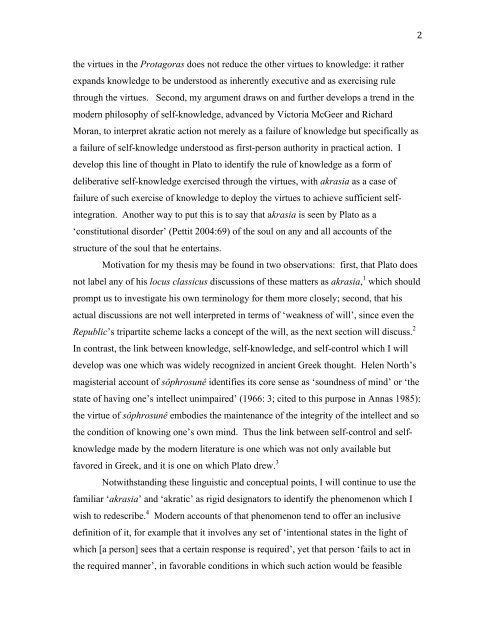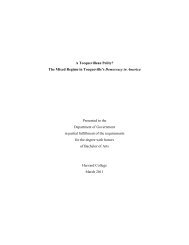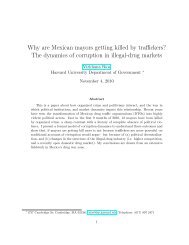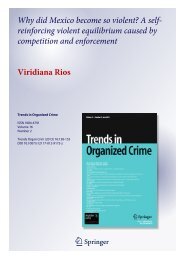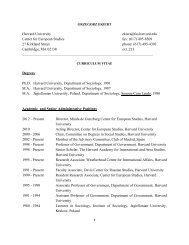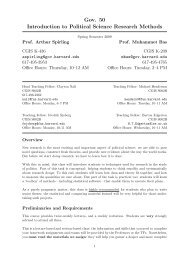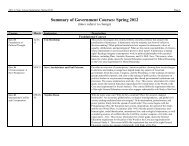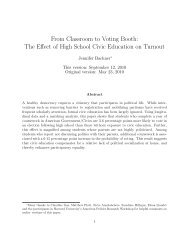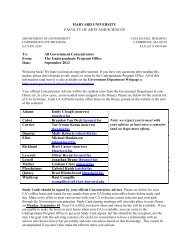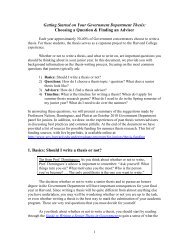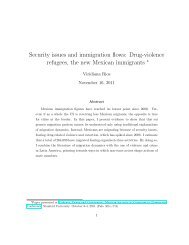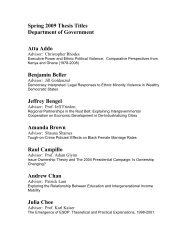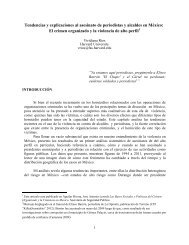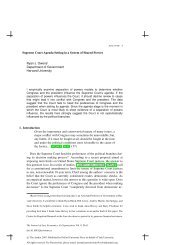1 Harvard University Political Theory Colloquium For 11 March 2010 ...
1 Harvard University Political Theory Colloquium For 11 March 2010 ...
1 Harvard University Political Theory Colloquium For 11 March 2010 ...
You also want an ePaper? Increase the reach of your titles
YUMPU automatically turns print PDFs into web optimized ePapers that Google loves.
2 <br />
the virtues in the Protagoras does not reduce the other virtues to knowledge: it rather<br />
expands knowledge to be understood as inherently executive and as exercising rule<br />
through the virtues. Second, my argument draws on and further develops a trend in the<br />
modern philosophy of self-knowledge, advanced by Victoria McGeer and Richard<br />
Moran, to interpret akratic action not merely as a failure of knowledge but specifically as<br />
a failure of self-knowledge understood as first-person authority in practical action. I<br />
develop this line of thought in Plato to identify the rule of knowledge as a form of<br />
deliberative self-knowledge exercised through the virtues, with akrasia as a case of<br />
failure of such exercise of knowledge to deploy the virtues to achieve sufficient selfintegration.<br />
Another way to put this is to say that akrasia is seen by Plato as a<br />
‘constitutional disorder’ (Pettit 2004:69) of the soul on any and all accounts of the<br />
structure of the soul that he entertains.<br />
Motivation for my thesis may be found in two observations: first, that Plato does<br />
not label any of his locus classicus discussions of these matters as akrasia, 1 which should<br />
prompt us to investigate his own terminology for them more closely; second, that his<br />
actual discussions are not well interpreted in terms of ‘weakness of will’, since even the<br />
Republic’s tripartite scheme lacks a concept of the will, as the next section will discuss. 2<br />
In contrast, the link between knowledge, self-knowledge, and self-control which I will<br />
develop was one which was widely recognized in ancient Greek thought. Helen North’s<br />
magisterial account of sôphrosunê identifies its core sense as ‘soundness of mind’ or ‘the<br />
state of having one’s intellect unimpaired’ (1966: 3; cited to this purpose in Annas 1985):<br />
the virtue of sôphrosunê embodies the maintenance of the integrity of the intellect and so<br />
the condition of knowing one’s own mind. Thus the link between self-control and selfknowledge<br />
made by the modern literature is one which was not only available but<br />
favored in Greek, and it is one on which Plato drew. 3<br />
Notwithstanding these linguistic and conceptual points, I will continue to use the<br />
familiar ‘akrasia’ and ‘akratic’ as rigid designators to identify the phenomenon which I<br />
wish to redescribe. 4 Modern accounts of that phenomenon tend to offer an inclusive<br />
definition of it, for example that it involves any set of ‘intentional states in the light of<br />
which [a person] sees that a certain response is required’, yet that person ‘fails to act in<br />
the required manner’, in favorable conditions in which such action would be feasible


